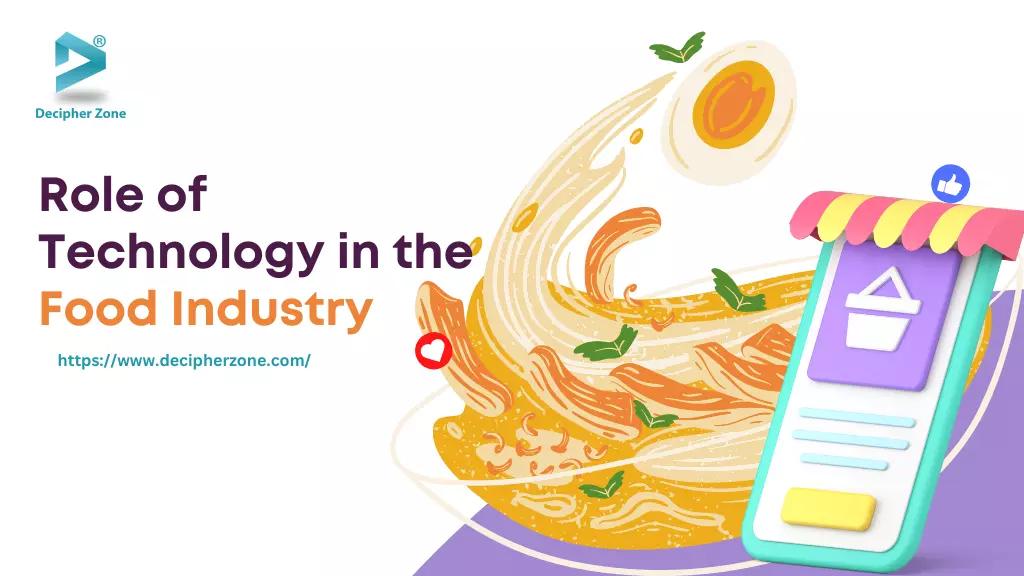Technology is paving new ways for the food and beverage industry. Growing environmental concerns has a crucial role to play in raising, producing, and distributing food. Manufacturers are now more vigilant toward curbing their carbon footprint.
Consequently, the food industry is moving towards innovation and adopting new methods for packaging and distributing food.
The Role of Technology in the Food Industry
Now, technology like robots, drones, and AI is reshaping the food industry. What is the role of technology in the food industry, and how is the technology resulting in the evolution of this sector? Let’s find out in detail.
Robotics
Robotics is the field making the food industry easy to operate. Robots help people to cope with their everyday tasks. For instance – robots can be used to cut the most difficult sections of the meat, thereby reducing the risk of injuries.
Also, robotic devices enhance the production process to make it safer and faster. Employees or workers are now more safe as robotics play a key role in taking over unsafe procedures.
Eco-friendly waste
Many consumers are now moving towards an eco-friendly lifestyle. They prefer sustainable options. This gives brands the motive to follow up with this trend and attract consumers.
Read: Multi-Vendor Food Delivery System
Do you know how technology is contributing to this trend? There are tech developments that actually follow edible packaging with zero waste.
Read: on-demand Cook Finder Software
Customers are choosing products that offer reusable packaging. Moreover, there are few websites where you can donate your unused food products.
AI-Based solutions
You should be knowing the number of food items you produce in a day, week, or month. If you don’t have any idea about it, you are just being ignorant of the production process.
AI-powered solutions like data analytics follow a data-driven approach to restaurant tech sales. Data analytics for the restaurant tech industry combines artificial intelligence and data science to help the sales team with the insights they need.
Read: Restaurant POS System
Food service technology companies can leverage the power of AI to take an insight-led approach and apply it accordingly to their sales strategy.
Blockchain methods
The modern age is the age of transparency. People take interest in sharing about their lives with others. The same goes true for the food items.
Individuals are now keen when it comes to knowing about the ingredients used in the preparation of the food products they are buying or consuming.
Read: Blockchain Technology in Enterprise Solutions
This is where blockchain methods come in. Blockchain methods help in gathering information about a product, like its origin and the process of preparing a product from start to finish.
It happens when a customer scans a product ID with their smartphones. It enhances the transparency and accountability of the products and the consumers.
Additionally, it becomes easy to trace the source of food contamination so that you can reduce the risk of foodborne illnesses. It also assists in automating the supply chain process.
Smart Sensors
Smart sensors have taken the world of production by storm. It has transformed the physical world into digital data and provided managers with priceless insights.
Sensors can accurately count the inventory and food ingredients. As a result, managers' work becomes more efficient. What’s more? Smart sensors can distinguish critical items responsible for the downtimes.
Read: Developing a Home Service Software
When delivering the products to the buyer, smart sensors control the steps of each and every product to check the food and beverage conditions.
You can install smart sensors in refrigerators, vehicles, and displays to steer clear of deviations. Workers get notified through a smartphone or desktop application if any problem arises.
Internet of Things
IoT is used in crop monitoring and irrigation. It allows you to centralize the information about plowing, irrigation, to name a few. For instance – sensors work well in grain bins which let the farmers monitor the moisture and temperature remotely.
Read: Top 10 IoT Security Threats and Solutions
Also, IoT can inform and warn manufacturers about supply chain issues that save them time as well as money.
Drones
Weather conditions and soil quality largely determines the fate of the agricultural sector. In the absence of new technology, workers would have to physically examine the crops for their quality.
This process requires a high level of accuracy and precision. And technology has reduced this load by assessing the crops accurately. Many companies are now using the facility of drones.
The drones fly over the field on various acres and assess the conditions. They check the crops and soil. Hence, they save your time and enhance productivity. Such pieces of information help companies to grow high-quality food.
Technology driving the food industry.
Climate change, competition, and the green movement – all these factors are the reasons the food industry is constantly looking to improve its products and services.
And latest tech innovations are rightly meeting the demands of this sector. Lastly, it is not only about the food ingredients but also about sustainability, improved storage, and helping the environment.

